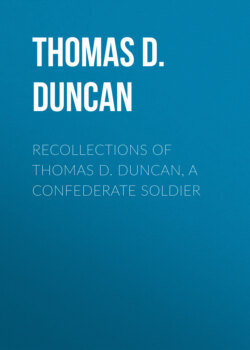Читать книгу Recollections of Thomas D. Duncan, a Confederate Soldier - Thomas D. Duncan - Страница 6
На сайте Литреса книга снята с продажи.
CHAPTER II
MOBILIZATION
ОглавлениеTable of Contents
MID the ever-growing dangers of that anxious year, our little command was ordered to Corinth, where the mobilization of the Western army had begun. To me this was a most welcome move, but for the majority of the boys, who were born and reared in that immediate section, it meant the first breaking of home ties—sad adieus and, to many, the last farewell.
Aside from the partings of kindred, lovers, and friends, there was a poignant sorrow over leaving Columbus, for its air of natural and restful beauty had cast a bewitching charm. Save one, it was the oldest town of Mississippi; and the history of its pioneers, the dim legends of its loves, romances, and tragedies, like its white-columned mansions, were foundationed in the long ago. The hearts of its people, ripe in sentiment and æsthetic culture, had been given in a flood of affectionate gratitude to the young soldiers, training within its gates, to defend the institutions, ideals, and traditions of the South.
Such a town could not but be the nursery of beauty and the home of hospitality, the two most persuasive influences that touch the heart of youth.
Soon after our arrival at Corinth our company was detached from the regiment for special or scout duty. Troops were then being sent to Island No. 10, Columbus (Ky.), Fort Henry, and Fort Donelson, Corinth being a distributing point.
The Confederacy was then establishing a line of defense from Columbus, Ky., on the Mississippi River, to Bowling Green, and on to Cumberland Gap, in Eastern Tennessee; and in the early autumn of 1861 there was much activity along this rather widely spaced line. There had been a slight clash at Columbus, Ky., and the battle of Fishing Creek, on the other end of the line, the most serious consequence of which was the death of the brilliant and promising General Zollicoffer.
The first Bull Run, back in July, had fanned away the last hope of compromise, and both North and South were athrob with the roll of mustering drums.
